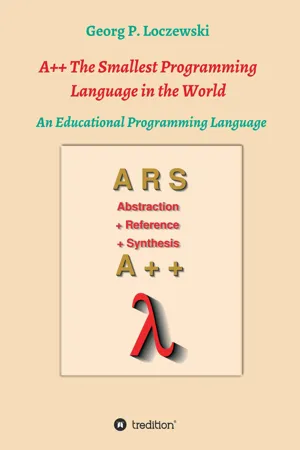
eBook - ePub
A++ The Smallest Programming Language in the World
An Educational Programming Language
This is a test
- 292 pages
- English
- ePUB (mobile friendly)
- Available on iOS & Android
eBook - ePub
A++ The Smallest Programming Language in the World
An Educational Programming Language
Book details
Book preview
Table of contents
Citations
About This Book
A++ has been developed in 2002 in the context of 'Programmierung pur' [Undiluted Programming] (ISBN 3-87820-108-7) with the purpose to serve as a learning instrument rather than as a programming language used to solve practical problems.A++ is supposed to be an efficient tool to become familiar with the core of programming and with programming patterns that can be applied in other languages needed to face the real world.This book does not only introduce A++ as a language, but also covers its implementation in Perl and C including an introduction to these languages using A++ itself.The book also contains an introduction to the Lambda-Calculus of Alonzo Church, which represents the theoretical foundation of A++.
Frequently asked questions
At the moment all of our mobile-responsive ePub books are available to download via the app. Most of our PDFs are also available to download and we're working on making the final remaining ones downloadable now. Learn more here.
Both plans give you full access to the library and all of Perlego’s features. The only differences are the price and subscription period: With the annual plan you’ll save around 30% compared to 12 months on the monthly plan.
We are an online textbook subscription service, where you can get access to an entire online library for less than the price of a single book per month. With over 1 million books across 1000+ topics, we’ve got you covered! Learn more here.
Look out for the read-aloud symbol on your next book to see if you can listen to it. The read-aloud tool reads text aloud for you, highlighting the text as it is being read. You can pause it, speed it up and slow it down. Learn more here.
Yes, you can access A++ The Smallest Programming Language in the World by Georg P. Loczewski in PDF and/or ePUB format, as well as other popular books in Biological Sciences & Science General. We have over one million books available in our catalogue for you to explore.
Information
Part II
A++ – The Implementation
Chapter 1
General Introduction
A++ has been implemented in the languages Scheme, Java, Python, C++, C and Perl. The first five implementations have been covered in ‘Programmierung pur’ ([27]), which has been published in German under the ISBN 3-87820-108-7.
The A++ implementations presented in the referenced book have been used as case studies (among others) to demonstrate ARS Based Programming in these specific languages. The A++ implementation in Perl, consisting of a WEB-based version and one that can be used in command line mode, has been developed recently as a by-product of my programming activities in Perl as a webmaster for an online book shop.
At the same time the A++ implementation in C has been updated, to reflect the same status as the implementation in Perl and is therefore also presented in this book.
Both implementations of the interpreter can be downloaded from the official A++ web-site at http:/www/lambda-bound.de/book/book.html and the Perl version can be run online in demo mode using the URL
http://www.lambda-bound.de/book/book.html.
The demo mode has been chosen to protect the multi-domain server from possible degradation of performance due to experimentation with A++ code. The downloadable implementations are provided in source code and are fully functional without imposed limitations.
The implementation of A++ in C and in Perl have been chosen for this book because of the follwing reasons:
• The programming languages C and Perl are very proven languages that have demonstrated their usefulness over a long period of time.
• C is still the prime language for systems programming and implementations written in C outperform any other implementation by an order of magnitude.
• Even though C as a language was not designed by it’s author for object oriented programming it is nevertheless possible to program in C using objects and closures as is demonstrated by the A++ Interpreter.
• The programming language C is available on almost any hardware platform and under any operating system.
• Perl is a very powerful and flexible language making it easy for programmers to natively apply ARS based programming patterns. Of course the programming language Scheme could have been chosen instead but unfortunately Scheme has not reached by far the degree of popularity as Perl and has gained its merits more in the academic field than in practical programming.
The last statement has to be commented because the reason for it is not an inferiority of Scheme but the fact that the Scheme standard is very minimal and practical Scheme implementations have to use many add-ons to make the language implementation usable for practical work.
This results in many different Scheme implementations making it a nightmare to look for the Scheme implementation of your choice. May be you won’t find the one that corresponds exactly to your needs1.
• How well Perl is suited to implement a programming language like A++, which is derived from the Lambda Calculus, is demonstrated...
Table of contents
- Cover
- Title
- Copyright
- Dedication
- Preface
- Contents
- I A++ – The Language
- II A++ – The Implementation
- Appendices